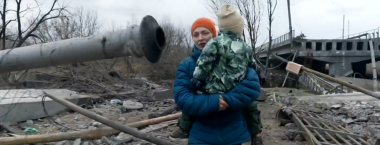
Why the European Court of Human Rights Remains Key to Justice for Ukraine
Ukraine’s latest request to the European Court of Human Rights (ECtHR) to order Russia to...
07 September 2022
16.02.2018
Olena Protsenko, a Lawyer at the Ukrainian Helsinki Human Rights Union (UHHRU), discusses the July 2017 ECtHR judgment Khlebik v Ukraine, and what it means in the context of the ongoing armed conflict in eastern Ukraine. UHHRU and EHRAC submitted a request for the case to be referred to the Grand Chamber for fresh examination. The request was rejected by the Court on 12 December 2017. In this blog, Olena explains the impact that a decision from the Grand Chamber could have had and why this was a missed opportunity for the Court.
Khlebik v Ukraine is one of only two cases lodged by persons affected by the armed conflict in eastern Ukraine on which the European Court of Human Rights (ECtHR) has delivered a judgment (in December 2017, there were over 3700 cases concerning the conflict or the annexation of Crimea pending before the Court). In a Chamber judgment, the ECtHR concluded that, although the applicant, Oleksandr Khlebik, spent four years in detention in Luhansk oblast (occupied by separatist forces a year after he began his sentence), serving a sentence that had not officially entered into force, Ukraine had not violated the applicant’s right to access to court and his right to an appeal in criminal cases (Art. 6 § 1 of the ECHR and Art. 2 Protocol 7 to the ECHR).

This judgment received plenty of attention in Ukrainian media, which hastened to conclude that Ukrainian authorities have no obligations under the European Convention on Human Rights (ECHR) to the citizens of the occupied territories. Indeed, the Court alluded that the application could have been lodged against Russia also:
“The Court notes at the outset that the scope of its examination of the case is delimited by the fact that the application is directed against Ukraine only (contrast, for example, Ilaşcu and Others v. Moldova and Russia [GC], no. 48787/99, ECHR 2004‑VII) and that the applicant did not allege that his rights had been breached due to a deficiency in the mechanisms of international cooperation between Ukraine and any other High Contracting Party” (§ 66).
However, the ECtHR also pointed out that Ukraine still bears a positive obligation, inter alia, to take all the measures available to it to organise its judicial system in a way that would render the rights guaranteed by Article 6 effective, in practice, in this specific situation. On 25 July 2017 the ECtHR found that in case of Mr Khlebik, Ukraine had complied with this obligation.
In 2013, the applicant was convicted by a first instance court in now-occupied territory of eastern Ukraine. He appealed against the sentence, and his case file was transferred to the Luhansk Region Appeal Court. While the applicant remained detained in the government-controlled Starobilsk awaiting the examination of his appeal, the ‘separatists’ occupied the city of Luhansk, leaving Ukrainian authorities with no effective control over these territories (including the administrative buildings within it). Court staff were ultimately unable to take documents kept in court buildings with them while escaping the hostilities, and bring them to government-controlled territories.
As a result of the conflict, the applicant’s case file remained in territory controlled by ‘separatists’, while he was in detention in Government controlled territory. The Ukrainian courts concluded that the criminal case files available to the applicant were not enough to consider his appeal. Nonetheless, the applicant remained detained on the basis of the judgment and sentence of the first instance court. It is noteworthy that, pursuant to the Ukrainian Criminal Procedure Code, if a sentence is appealed, it is not final until the appeal is heard. Thus, the applicant served a sentence that was not in force and apparently never will be.
UHHRU considers that, in this case, Ukrainian authorities provided very limited information about the efforts made to reacquire the applicant’s case file. They did not specify which efforts were actually used and why they turned out to be unsuccessful, taking into account that prosecutors have been able to retrieve – even if partially – other lost case files (according to the OSCE’s Monitoring Mission report on ‘Access to Justice and the Conflict in Eastern Ukraine’). The ECtHR concluded that Ukraine was prevented from effectively addressing the applicant’s situation because of the status quo.
However, UHHRU considers that the ongoing military conflict should not excuse the authorities from their obligation to deal with the situation where the rights to personal liberty and to appeal are at stake. Being well aware that the applicant was serving a sentence that was not actually in force, the Ukrainian authorities took no steps to create effective remedies to solve the issue in a timely manner, for instance:
Given that the Court’s case law on the matter of restoration of case-files is rather scarce, in Khlebik v Ukraine the ECtHR could have developed its approach. However, the Chamber failed to set out the principles that could determine the scope of obligations of the Member States in cases when the case files have been irreparably lost or destroyed in a conflict situation.
Another disturbing issue is that the Chamber effectively imposed the burden of proof largely on the applicant. The Court only analysed the three possible solutions to the case suggested by Mr Khlebik; and the Government, which alone has access to information capable of corroborating or refuting the applicant’s allegations, was placed in a position of a ‘silent observer’.
UHHRU and EHRAC drew on these arguments to request the case be referred to the ECtHR’s Grand Chamber for fresh examination. We believe that Ukraine’s reluctance to adopt relevant measures cannot and should not be justified by the unstable situation in the eastern Ukraine. Had the Grand Chamber accepted UHHRU’s and EHRAC’s referral request, this could have been a further opportunity to address the paucity of case law on the issue of the restoration case files, which would have a great impact across the occupied territories of eastern Ukraine. There are at least 60 individuals convicted at a first instance court of serious crimes who are imprisoned in government-controlled areas awaiting an appeal, but whose case files remain in non-government-controlled areas (see p. 30 of the OSCE’s Monitoring Mission report on ‘Access to Justice and the Conflict in Eastern Ukraine’). We consider that the situation of uncertainty in which these people find themselves requires urgent measures: waiting until the end of the armed conflict in Ukraine is not an option. The Grand Chamber’s re-examination of this case could have been a crucial tool in pushing the Ukrainian authorities to react to the situation more promptly and efficiently.
On 13 February 2018 the Court delivered a judgment in another case lodged by residents of occupied territories of eastern Ukraine, Tsezar and Others v. Ukraine. The applicants in this case claimed that by relocating the domestic courts from the occupied territories to neighbouring regions under Ukrainian control, their access to the necessary court to challenge the amount of their social benefits was impaired. The ECtHR once again concluded that Ukraine had done everything in its power to respect the applicants’ right of access to a court. As concerns the issue of discrimination raised by the applicants on the basis of their place of residence, the European Court found that the courts’ relocation was aimed not at restricting the rights of those who lived in the occupied territories, but on the contrary, at ensuring their access to a court. It is thus to be concluded that the approach set by the Court in Khlebik v Ukraine has been maintained in the recent Tsezar and Others v. Ukraine judgment.
Text by Olena Protsenko, a lawyer at the Ukrainian Helsinki Human Rights Union (UHHRU), prepared for ehrac.org.uk
If you find an error on our site, please select the incorrect text and press ctrl-enter.

Ukraine’s latest request to the European Court of Human Rights (ECtHR) to order Russia to...
07 September 2022

The family, twice refugees, ask for help from UHHRU – in 2014, the spouses Yarovoy...
27 May 2022

We would like to offer you the Digest of the Ukrainian Helsinki Human Rights Union,...
22 December 2021

We would like to offer you the Digest of the Ukrainian Helsinki Human Rights Union,...
18 November 2021